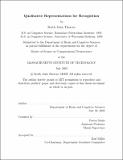| dc.contributor.advisor | Pawan Sinha. | en_US |
| dc.contributor.author | Thoresz, Keith John, 1972- | en_US |
| dc.contributor.other | Massachusetts Institute of Technology. Dept. of Brain and Cognitive Sciences. | en_US |
| dc.date.accessioned | 2005-05-19T15:04:03Z | |
| dc.date.available | 2005-05-19T15:04:03Z | |
| dc.date.copyright | 2002 | en_US |
| dc.date.issued | 2002 | en_US |
| dc.identifier.uri | http://hdl.handle.net/1721.1/16863 | |
| dc.description | Thesis (S.M. in Computational Neuroscience)--Massachusetts Institute of Technology, Dept. of Brain and Cognitive Sciences, 2002. | en_US |
| dc.description | Includes bibliographical references (p. 75-80). | en_US |
| dc.description | This electronic version was submitted by the student author. The certified thesis is available in the Institute Archives and Special Collections. | en_US |
| dc.description.abstract | This thesis describes a representation for objects and scenes that is stable against variations in image intensity caused by illumination changes and tolerant to image degradations such as sensor noise. The representation, called a ratio-template, uses low-resolution ordinal contrast relationships as its matching primitives. The choice of these primitives was inspired not only by considerations of computational simplicity and robustness, but also by current knowledge of the early stages of visual processing in the primate brain. The resulting representation is biologically plausible, although there is currently no evidence to suggest that the representation is actually used by the primate visual system. Constructed manually at first, the ratio-template can be learned automatically from a set of examples. Two applications--face detection and scene indexing--are described. The ratio-template achieves detection rates higher than 90% and can process a 320×280 pixel image in 2.6 seconds at multiple scales. | en_US |
| dc.description.statementofresponsibility | by Keith John Thoresz. | en_US |
| dc.format.extent | 80 p. | en_US |
| dc.format.extent | 1927702 bytes | |
| dc.format.extent | 1927437 bytes | |
| dc.format.mimetype | application/pdf | |
| dc.format.mimetype | application/pdf | |
| dc.language.iso | eng | en_US |
| dc.publisher | Massachusetts Institute of Technology | en_US |
| dc.rights | M.I.T. theses are protected by copyright. They may be viewed from this source for any purpose, but reproduction or distribution in any format is prohibited without written permission. See provided URL for inquiries about permission. | en_US |
| dc.rights.uri | http://dspace.mit.edu/handle/1721.1/7582 | |
| dc.subject | Brain and Cognitive Sciences. | en_US |
| dc.title | Qualitative representation for recognition | en_US |
| dc.type | Thesis | en_US |
| dc.description.degree | S.M.in Computational Neuroscience | en_US |
| dc.contributor.department | Massachusetts Institute of Technology. Department of Brain and Cognitive Sciences | |
| dc.identifier.oclc | 51639438 | en_US |
